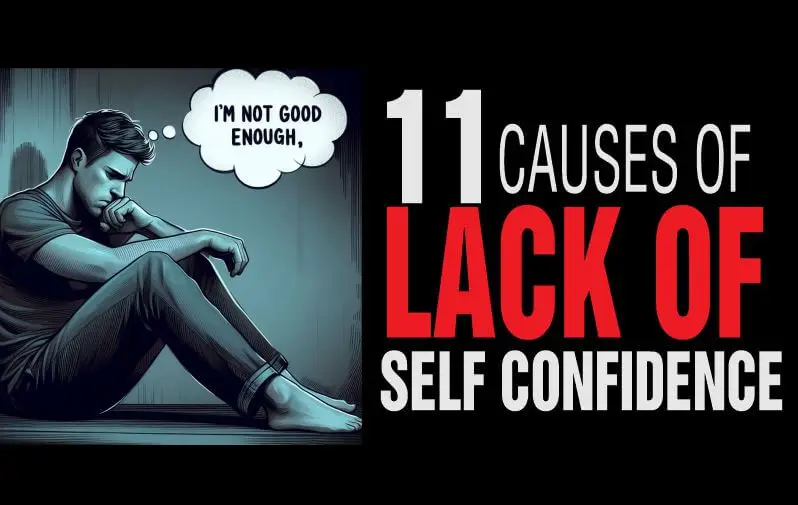Understanding the causes of lack of self-confidence is important for overcoming self-doubt and building a stronger sense of self-worth, as these are prerequisites for setting and achieving life goals.
Confidence is the foundation upon which we build successful and fulfilling lives.
However, for many, a lack of self-confidence can be an inescapable burden, acting as a hindrance to personal growth and happiness.
Uncovering the root culprits of low self-confidence is essential to overcoming this hurdle and creating a positive change in our lives.
We have detailed 11 significant causes of low self-confidence and provide insights into how you can address them and nurture a healthier sense of self-assurance.
New to confidence? Start here.
Overview of Self-Confidence
Self-confidence is a belief in your abilities, skills, and overall worth as an individual.
It is the assurance that one can successfully navigate through challenges and achieve desired goals.
It is characterized by a positive and healthy self-image, which empowers you to trust yourself and take on new opportunities with enthusiasm.
It is essential for personal growth and success as it enables you to overcome self-doubt, embrace your strengths, and persist in the face of adversity.
A strong sense of self-confidence promotes resilience, assertiveness, and the ability to handle criticism constructively, ultimately leading to increased happiness and fulfillment in life.
Signs of Lack of Self-Confidence
A lack of self-confidence often shows through both behavior and mindset.
You might notice poor body language, like slumping shoulders, avoiding eye contact, or fidgeting, which signals discomfort.
Negative self-talk, constant self-doubt, and seeking validation from others also indicate low self-assurance.
Fear of taking risks, difficulty making decisions, perfectionism, and avoidance of social situations can further reflect self-doubt.
Procrastination, over-reliance on reassurance, being overly self-critical, and struggling to accept compliments or assert yourself in groups are additional signs.
Recognizing these patterns is the first step toward building stronger self-belief and improving interactions in personal and professional settings.
For a detailed guide on identifying and addressing these behaviors, read our full post: Signs of Lack of Self-Confidence.
Related Posts
How to Speak Confidently in Public
Differences between Self-Esteem and Self-Confidence
Telltale Signs of Low Self-worth in Men
Examples of Positive Self-talk to Improve Self Esteem
Causes of Lack of Self-Confidence

1. Negative Self-Talk
Negative self-talk is like a toxic internal companion, constantly undermining your confidence.
This inner dialogue shapes your perception, making you question your abilities and self-worth.
To overcome this cause, practice self-awareness by recognizing negative self-talk patterns.
Challenge these thoughts by replacing them with positive affirmations, focusing on your strengths, and celebrating your accomplishments.
2. Childhood Influences
Childhood experiences shape your self-esteem significantly.
If you grew up in an environment filled with criticism, neglect, or undue pressure, it can leave deep-rooted scars on your self-confidence.
Recognize these influences and seek professional help or build a support network to rewrite the narrative, overcome past trauma, and develop healthy self-esteem.
3. Lack of Role Models
The absence of positive role models can impact your perception of what is possible in life.
Without inspirational figures, you may struggle to envision success for yourself.
Seek out mentors, join supportive communities, or find inspiration in stories shared by individuals who have overcome similar obstacles.
Surrounding yourself with strong role models can be pivotal in boosting your self-confidence.
4. Fear of Rejection
The fear of rejection can paralyze even the most talented individuals.
The desire to please others and avoid disapproval can hold you back from taking risks and reaching your potential.
Recognize that rejection is a natural part of life, and use it as an opportunity for growth. Embrace failure as a chance to learn and build resilience.
Surround yourself with supportive individuals who encourage and uplift you, enabling you to take calculated risks without fear.
5. Perfectionism
Perfectionism can be a silent confidence killer, as it sets unrealistic expectations and creates a fear of failure.
The constant pursuit of flawless outcomes hinders progress and erodes self-esteem.
Embrace imperfections as valuable learning experiences and shift focus to effort and growth rather than aiming for perfection.
Challenge yourself to prioritize progress over perfection and celebrate incremental achievements along the way.
6. Comparison and Social Media
Comparing ourselves to others, especially through social media, can be detrimental to our self-confidence.
Encouraging an unrealistic and distorted perception of reality, constant comparison breeds insecurities and self-doubt.
Limit your exposure to social media, practice gratitude for your journey, and focus on self-improvement rather than external validation.
7. Lack of Clear Goals
When we lack clear goals, it becomes challenging to measure progress or define success.
Without a sense of direction, our self-confidence may dwindle, leaving us feeling lost and unaccomplished.
Set specific, achievable goals that align with your values and passions.
Break them into smaller, manageable tasks, allowing you to track your progress and celebrate milestones.
8. Past Failures
Previous failures can cast a long shadow over your self-confidence, making you doubt your abilities in present or future endeavors.
Accept that failure is inevitable on the path to success and view it as an essential element of growth.
Learn from your mistakes, retrieve valuable lessons, and use them as stepping stones towards future achievements.
9. Lack of Self-Care
Neglecting our physical, mental, and emotional well-being can significantly impact our self-confidence.
When we disregard self-care routines, we may feel drained, unmotivated, and less inclined to believe in ourselves.
Prioritize self-care by adopting healthy habits such as regular exercise, sufficient sleep, nourishing nutrition, and engaging in activities that bring you joy and relaxation.
10. Lack of Skill or Knowledge
When you lack the necessary skills or knowledge in a particular domain, your self-confidence may take a hit.
Combat this cause by investing in self-improvement through education, training, or seeking guidance from experts.
Recognize that acquiring expertise is a journey, and every small step forward will contribute to enhancing your confidence in that area.
11. Negative Influences
Surrounding ourselves with negative influences can inadvertently erode our self-confidence.
Toxic relationships, unsupportive friends, or environments that breed negativity can subconsciously dictate our self-worth.
Evaluate your relationships and environments, and take steps to distance yourself from negativity.
Seek out individuals who uplift and inspire you, fostering positive and empowering connections.
Related: How to Build Mental Strength
Overcoming Lack of Self-Confidence
Overcoming a lack of self-confidence involves acknowledging negative beliefs, challenging them, and reframing thoughts with positive affirmations.
Seeking support from trusted individuals, such as friends, family, or a therapist, can provide a valuable perspective and encouragement.
Setting achievable goals and celebrating small victories builds momentum.
Engaging in activities that showcase strengths and interests bolsters self-esteem.
Embracing failure as a natural part of growth and learning fosters resilience.
Practicing self-care, including exercise, adequate rest, and healthy habits, supports overall well-being.
By gradually stepping out of your comfort zone and facing fears, you can reclaim your self-worth and cultivate a stronger sense of confidence.
Frequently Asked Questions
What causes a lack of self-confidence?
Lack of self-confidence can stem from past failures, negative self-talk, comparison to others, and a fear of rejection or criticism.
What are the factors of a lack of confidence?
Factors contributing to lack of confidence include childhood experiences, negative feedback, perfectionism, lack of support, and unrealistic expectations.
How do you cure a lack of self-confidence?
Curing lack of self-confidence involves self-compassion, positive affirmations, setting achievable goals, seeking support, practicing self-care, and facing fears gradually.
What are the signs of low confidence?
Signs of low confidence include self-doubt, avoiding challenges, seeking constant approval, fear of failure, negative self-talk, and reluctance to speak up.
Conclusion
Understanding the various causes of lack of self-confidence is the first step towards overcoming it.
Whether it’s past experiences, societal pressures, or negative self-perception, recognizing these factors empowers you to take proactive steps towards building your confidence.
By addressing these causes head-on, seeking support, and practicing self-compassion, you can gradually cultivate a healthier self-image and embrace your true potential.
Remember, self confidence is a journey, and with patience and perseverance, positive change is achievable.
References:
- https://liveboldandbloom.com/10/self confidence/lack-of-confidence
- https://www.lifehack.org/565816/low-self-esteem
- https://www.fingerprintforsuccess.com/blog/low-self-esteem
- https://www.linkedin.com/pulse/signs-lacking-confidence-richard-l-wilson-m-ed-
Pyo Merez (PsyD) is a distinguished adolescent and adult psychologist at the forefront of mental health advocacy.
With expertise in cognitive and developmental psychology, focusing on social relationships, cultural contexts, and individual differences, Pyo has dedicated his career to empowering adolescents and adults.
As a sought-after speaker and panelist, Pyo shares invaluable insights on issues affecting young people, contributing to a deeper understanding of mental health and well-being in today's society.

